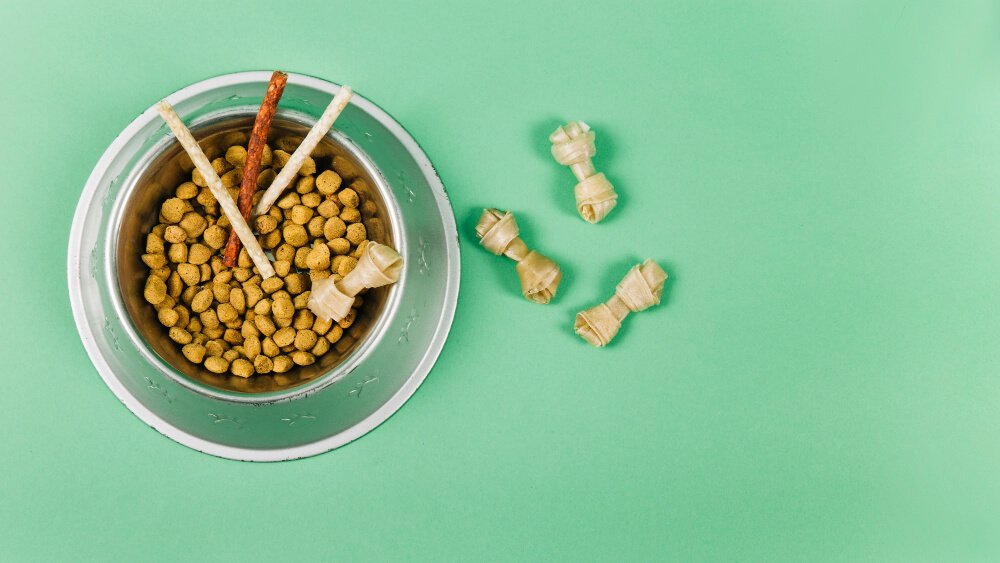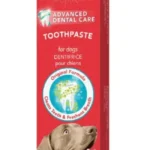Wondering what is the best dry food for Bernedoodle puppy? Bernedoodle puppies are a delightful mix of Bernese Mountain Dog and Poodle. They inherit distinct traits like playful energy, soft curly coats, and a need for social interaction. With their growing popularity, new owners often ask, “What food to feed a Bernedoodle puppy?”
The answer isn’t simple, as this breed comes with specific dietary needs that require high-quality and balanced nutrition. This guide dives into their nutritional requirements, reviews outstanding dry food brands in-depth, and answers key questions about raising a happy and healthy Bernedoodle.
Table of Contents
- Understanding Your Bernedoodle Puppy’s Nutritional Needs
- How to Feed a Bernedoodle Puppy
- Specific Nutritional Needs
- What You Should Know about Dry Food for Bernedoodle Puppies
- How Dry Food Affects Bernedoodle Growth and Health
- The Best Dry Food for Bernedoodle Puppy
Understanding Your Bernedoodle Puppy’s Nutritional Needs
Bernedoodle puppies are adorable, fluffy bundles of energy. However, their nutritional needs slightly differ from other breeds due to their unique mix of Bernese Mountain Dog and Poodle ancestry. They require a balanced diet rich in protein, fats, carbohydrates, vitamins, and minerals. Here’s a breakdown of their primary dietary requirements:
- High-Quality Protein
Puppies need protein to grow muscles, tissues, and a strong immune system. For a Bernedoodle, aim for food with 22-30% protein. Look for quality sources like chicken, turkey, fish, or lamb. - Healthy Fats
Fats provide energy and support brain development. For Bernedoodle puppies, 12-20% fat in their diet is ideal. Healthy fats come from sources like fish oil, chicken fat, or flaxseed. - Carbohydrates for Energy
Carbs fuel their active lifestyle. Choose whole grains like brown rice or oats or alternatives like sweet potatoes. - Calcium and Phosphorus
These minerals are essential for bone growth. Look for puppy food with the correct ratio (about 1.2 to 1 of calcium to phosphorus). - Omega-3 Fatty Acids
Omega-3s help with brain development, a shiny coat, and reducing inflammation. Check for foods with added fish oil or DHA. - Vitamins and Minerals
Vitamins like A, B, C, and E, along with minerals like zinc, support your puppy’s overall health. Most high-quality puppy foods include these.
Why Are These Nutrients Important?
The first year of a puppy’s life is critical. Their bones, organs, muscles, and immune system are developing quickly. If they lack the right nutrients, they may face growth or health issues later in life. A well-balanced diet ensures your Bernedoodle puppy grows into a healthy adult with strong bones, robust immunity, and a shiny coat.
How Are Bernedoodles Different?
While all puppies need proper nutrition, Bernedoodles have unique dietary needs due to their genetic mix. Here’s how they differ:
- Slower Growth Rate
Bernedoodles, especially standard-sized ones, grow slower compared to smaller breeds. Overfeeding can lead to fast growth, which may strain their joints or cause hip dysplasia. Feeding them a diet specific to large-breed puppies can prevent these problems. - Energy Levels Vary
Bernedoodles inherit energy levels from both Poodles and Bernese Mountain Dogs. Their diet must balance energy-rich foods while preventing weight gain, especially as they mature. - Sensitivity to Allergies
Some Bernedoodles might inherit food sensitivities. Common food allergens like wheat, corn, or soy may not suit them. Monitor their reactions to new foods and consult your vet if you see signs of allergies. - Size Variations
Depending on whether your Bernedoodle is a mini, medium, or standard size, their calorie needs will differ. Smaller Bernedoodles need fewer calories compared to their larger counterparts.
How to Feed a Bernedoodle Puppy
- Choose High-Quality Puppy Food
Select a brand specifically made for puppies, especially large-breed puppies if your Bernedoodle is standard-sized. Look for foods with natural ingredients and added DHA for brain development. Also, opt for low sodium foods for better health. - Stick to a Routine
Feed your puppy 3-4 small meals a day. This ensures they don’t overeat and helps with digestion. Switch to two meals a day once they’re 6-12 months old. - Monitor Portions
Overfeeding can lead to obesity. Follow the feeding guidelines on your dog food package and adjust based on your puppy’s growth and activity levels. - Introduce New Foods Gradually
If you’re switching foods, do it slowly over 7-10 days. This prevents stomach issues. - Provide Fresh Water
Always keep a bowl of clean water available for your puppy. Hydration is just as important as food.
Foods to Avoid
Certain foods can be harmful to Bernedoodle puppies. Avoid giving them:
- Chocolate
- Grapes or raisins
- Onion or garlic
- Fatty human foods
- Xylitol (a sweetener found in gum and candies)
Meeting your Bernedoodle puppy’s nutritional needs sets the foundation for a healthy, happy life. Choose a high-quality, balanced puppy food, feed the right portions, and adjust as they grow. Always consult your vet if you’re unsure what’s best for your furry friend. Check out AKC Tips on Puppy Nutrition for more guidance.
Do Bernedoodles have sensitive stomachs?
Yes. They often inherit digestion issues from their Poodle lineage, which can make them intolerant to low-quality fillers like corn, soy, or dairy. Easily digestible ingredients, such as pumpkin, probiotics, and whole grains, can prevent common problems like diarrhea or bloating. If your pup shows signs of sensitivity, consider trialing a clean food option like Spot & Tango’s UnKibble, as it’s gentle on digestion.
What protein is best for Bernedoodles?
Animal proteins are essential. Chicken, lamb, and fish provide amino acids to fuel muscle growth and energy. Fish, in particular, is rich in omega-3, which supports their skin and keeps that signature curly or wavy coat shiny. Some, however, might have sensitivities to specific proteins, like chicken. If your Bernedoodle reacts poorly, consider foods with novel protein sources such as salmon, duck, or turkey.
Specific Nutritional Needs
Growing Bernedoodles need food high in protein and healthy fats. Omega-3 and omega-6 fatty acids smooth coat texture and reduce shedding. Glucosamine and chondroitin support joint strength, a critical area for standard Bernedoodles prone to hip or elbow dysplasia. Grain-inclusive formulas rich in oats or brown rice provide energy while being easy to digest. If your puppy struggles, you might wonder, “What foods are Bernedoodles sensitive to?” The culprits are often artificial preservatives or wheat-based fillers, so avoid those at all costs.
Factors to Consider When Choosing Dry Food
- Ingredient Quality
Kibble packed with whole proteins (like real chicken or lamb) and organic fruits or vegetables surpasses cheaper by-product-heavy foods. Avoid artificial fillers and unrecognizable meat meals. - Sensitive Digestion
For puppies with delicate tummies, skip dairy-heavy and grain-intense recipes. Look for pumpkin, sweet potato, or millet for easy digestion. - Specific Nutritional Additions
DHA promotes cognitive development in puppies. Glucosamine keeps larger Bernedoodles’ joints strong as they grow. - Palatability
Does your puppy refuse their meals? Bernedoodles are notoriously picky. Make sure their food tastes good through natural flavors like turkey or fish.
What You Should Know about Dry Food for Bernedoodle Puppies

Feeding your Bernedoodle puppy the right type of food is key to their health and growth. Dry food, also called kibble, is a popular choice among dog owners. It’s convenient and comes in a variety of formulas designed to meet specific dietary needs. But how does dry food affect Bernedoodle puppies, and is it the best option for them? Let’s explore.
Benefits of Dry Food for Bernedoodle Puppies
- Supports Dental Health
Chewing kibble can help reduce plaque and tartar buildup on your puppy’s teeth. The crunchiness of dry food scrapes off debris, keeping their teeth cleaner than soft food alone. - Convenience for Owners
Dry food is easy to store, measure, and serve. It doesn’t spoil as quickly as wet food and is great for meal prep, especially if you’re on a schedule. - Formulated Nutrition
High-quality dry puppy food provides a balanced mix of protein, fats, vitamins, and minerals tailored for growing dogs. Look for brands made for large-breed puppies if your Bernedoodle is standard-sized. - Portion Control
Dry food allows for precise portioning based on your puppy’s size and activity. This avoids overfeeding, which is critical for Bernedoodles prone to weight issues or joint stress.
Potential Drawbacks of Dry Food for Bernedoodles
- Limited Hydration
Kibble lacks moisture, so it doesn’t contribute to hydration like wet food does. Dehydration can be an issue if your puppy isn’t drinking enough water. Always provide fresh water alongside dry food. - Food Allergies or Sensitivities
Some Bernedoodles have sensitive stomachs or food allergies. Certain kibble recipes may contain fillers like corn or soy, which can irritate their digestive system. - Less Appealing for Picky Eaters
Bernedoodles sometimes lean toward picky eating habits. Dry food can lack the strong aroma or texture that entices them, making mealtime a challenge. - Added Preservatives
Some commercial dry foods contain synthetic preservatives or artificial flavors. These additives can be harmful over time. Choose natural, high-quality kibble to avoid these risks.
How Dry Food Affects Bernedoodle Growth and Health
Dry food plays a big role in your Bernedoodle puppy’s growth and overall health when chosen wisely. Here’s what happens:
- Bone Strength
Many kibbles for large-breed puppies contain the ideal calcium-to-phosphorus ratio to ensure steady bone growth. This is vital for Bernedoodles, as fast or uneven growth can lead to joint issues later in life. - Weight Management
Since Bernedoodles are prone to obesity, especially as they age, kibble with controlled calorie content helps regulate their weight. Look for kibble that’s high in protein but not overly rich in calories. - Energy Levels
Quality dry food supplies energy for their playful nature. Balanced carbs and fats keep them active without leading to excessive weight gain. - Skin and Coat Health
Kibble recipes enriched with omega-3 fatty acids and vitamins support a shiny, healthy coat. This is crucial for Bernedoodles with their fluffy, curly fur.
Tips for Feeding Dry Food to Your Bernedoodle Puppy
- Start Gradually
Introduce dry food slowly if your puppy isn’t used to it. Mix it with wet food or water to soften it at first. - Use Proper Portions
Follow the feeding guidelines on the packaging. Adjust as your pup grows and their calorie needs change. - Combine with Wet Food (Optional)
Mixing a little wet food with kibble can make meals more appealing while adding moisture. - Track Their Growth
Monitor your puppy’s weight and size. If you notice rapid weight gain or sluggishness, review their food quantity and ingredients.
Dry food has many advantages for Bernedoodle puppies, from dental health benefits to convenience. However, not every type of kibble suits this breed’s specific needs. Look for high-quality options that match their size, energy levels, and sensitivities. Always keep an eye on your puppy’s growth and consult your vet for tailored recommendations.
By choosing the right dry food and feeding responsibly, you’ll set your Bernedoodle on the path to a healthy, happy life. Happy feeding!
The Best Dry Food for Bernedoodle Puppy

Choosing the right dry food for your Bernedoodle puppy is one of the most important decisions for their health and happiness. With their unique mix of Poodle energy and Bernese Mountain Dog size, they need a diet that matches their specific needs. Here’s a closer look at kibble that suits Bernedoodle puppies perfectly. Beyond promises, these come highly rated for their quality.
1. The Farmer’s Dog Kibble
The Farmer’s Dog entered the kibble market with a promise to change the game. Their dry food provides freshness and high meat content, unlike overprocessed standard kibbles. What’s special here is the customization. This brand lets you tailor meals based on your Bernedoodle puppy’s weight, size, and energy level.
- Key Ingredients: Deboned beef, pork liver, and carrots with added flaxseed for omega fatty acids. No corn or soy fillers, making it hypoallergenic.
- Why It’s Great: The omega-3/6 blend gives your puppy’s wavy coat a glossy, soft finish. Because Bernedoodles have sensitive stomachs, this minimally processed food significantly reduces bloating or upset stomachs.
- Drawback: It’s a premium option, so the cost is higher. However, the quality more than justifies the expense.
2. Spot & Tango UnKibble
UnKibble by Spot & Tango isn’t your average dry food. Its human-grade ingredients make this light, fresh kibble ideal for sensitive puppies. Unlike heavy, dense kibble, this is air-dried and perfectly portioned.
- Key Ingredients: Chicken breast, eggs, brown rice, spinach, and flaxseeds.
- Why It’s Great: It includes brown rice, which many sensitive Bernedoodles tolerate (solving the “What foods are Bernedoodles sensitive to?” question). DHA ensures sharp cognitive skills and happy alertness during training. Bonus? Picky eaters adore it.
- Drawback: The resealable meal bags can run out quickly for larger Bernedoodles, so buy in bulk.
3. Jinx Puppy Food
Jinx combines clean proteins with additional functional ingredients specifically for growth and digestive issues. Its grain-inclusive formula strikes balance without triggering symptoms in sensitive dogs.
- Key Ingredients: Chicken, pea protein, pumpkin, and probiotics.
- Why It’s Great: Pumpkin offers fiber, minimizing gut distress. The addition of DHA from fish oil enriches brain development, which is useful for energetic problem-solvers like Bernedoodles. Puppies have active phases, and Jinx helps provide the sustained energy they need.
- Drawback: Some may find the protein variety limited, though the flavor consistency works for fussy eaters.
4. Sundays for Dogs
Among the best dry food for Bernedoodle puppy is Sundays for Dogs. It is a shelf-stable, air-dried wonder eliminates the hassle of raw food while still delivering nutrition. Sundays incorporates novel proteins, light carbs, and lots of nutrient density into every piece.
- Key Ingredients: Beef, quinoa, kale, and pumpkin. Glucosamine included.
- Why It’s Great: Joint health is a priority for larger Bernedoodles, and Sundays’ glucosamine reinforces mobility early. The absence of unnecessary fillers like wheat reduces chances of irritation or allergies. Nutritionally dense in small portions, it’s ideal for families feeding multiple times daily.
- Drawback: Although convenient, some owners find air-dried kibble texture takes time for puppies to accept.
5. Open Farm Puppy Recipe
Known for sustainability, Open Farm gives transparency with its ingredient sourcing. Its puppy formula perfectly blends responsibly farmed proteins with antioxidant-rich veggies.
- Key Ingredients: Chicken, white fish, locally sourced veggies, and sunflower oil for omega-6.
- Why It’s Great: If you’ve wondered “Can Bernedoodles eat chicken?”, this choice proves they can, provided the chicken is high-quality and cooked. Open Farm also addresses DHA needs for puppies exploring—and likely chewing—everything.
- Drawback: It’s grain-inclusive, so dogs intolerant to grains needs alternatives.
Choose the best dry food for Bernedoodle puppy food to nurture their playful, loving personality while supporting their health for years to come. Consult your vet to match food with your puppy’s specific needs. A strong nutritional foundation ensures your Bernedoodle thrives!





